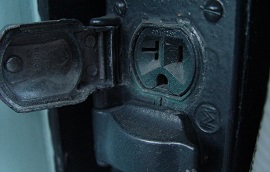 A few years ago you may have considered that surge protection was only necessary for electronic items such as computers, expensive music systems or big screen televisions. These days, this is not the case as many items around our homes have computers and CPUs using printed circuit boards, creating more opportunities for surges to damage your expensive appliances, including modern furnaces and HVACs.
A few years ago you may have considered that surge protection was only necessary for electronic items such as computers, expensive music systems or big screen televisions. These days, this is not the case as many items around our homes have computers and CPUs using printed circuit boards, creating more opportunities for surges to damage your expensive appliances, including modern furnaces and HVACs.
How a Surge Protector Works:
Surge protectors or suppressors are designed to protect any electrical appliance from spikes in power. The protector limits the voltages supplied to the device by one of two methods, either shorting to the ground or blocking unwanted voltages that occur above a “safe” threshold limit. There are a number of surge protector options available for domestic use. These vary from power strips with basic surge protection already built-in to a whole of house system, which require professional installation.
Why an HVAC System Needs Surge Protection?
HVAC systems can be costly to repair or even replace. Power grid issues and lightning can cause power surges that have the potential to destroy vital components of your system. Modern HVAC systems have an abundance of computer “brains” and electronic components, making them more vulnerable to power surges. The extent of this damage is difficult to estimate. In the worst case, a power surge could cause so much damage that you will need to totally replace the electronic mother board of your system. This could not only be highly expensive, but could also mean that you have the inconvenience of sitting in the freezing cold waiting for a contractor.
Prevention Rather Than Cure:
Although a power surge may not completely destroy your system, it could cause small areas of damage that could develop into a large problem. This will force you to pay larger repair bills. Buying a surge protector is a small investment to prevent these types of problems and issues. It is possible to buy either a separate surge suppressor for your unit or invest in a whole of home surge protector. This more sophisticated surge protector is attached to your main breaker box and will provide protection for all the electronic items in your home.
When you consider that your HVAC system has an average lifespan of fifteen years, and is one of the most expensive appliances in your home, investing in a surge protector is a small cost compared to a premature replacement of your system. These savings do not even consider the potential cost of contractor calls and replacement parts. You can also avoid the inconvenience of scheduling repairs and taking time out of your busy day to wait in for a technician. Additionally, since power spikes are more likely to occur during winter thunderstorms, you also risk your home being left freezing cold while you wait for repairs.
If you haven’t considered taking steps to protect all your electronic items, including your HVAC system, it is vital that you take the time now. You may regret saving a few dollars by not buying a surge protector if one big winter storm in the expected El Nino causes a power spike that compromises your whole system. You simply need to consider the cost of a surge protector against the potential cost of any repairs or the loss/replacement value of your damaged equipment.
